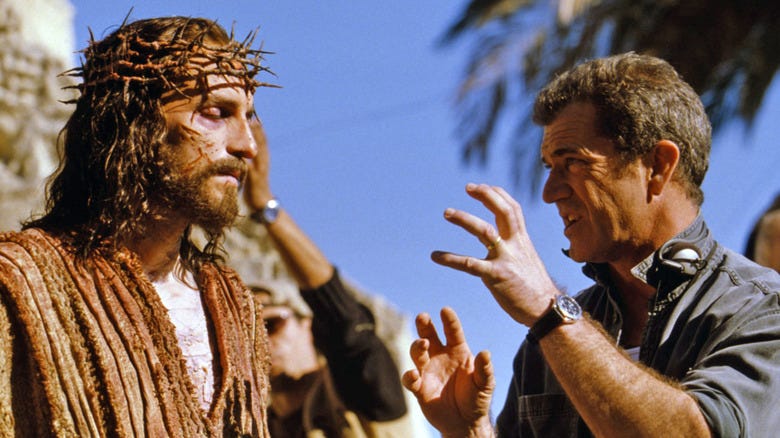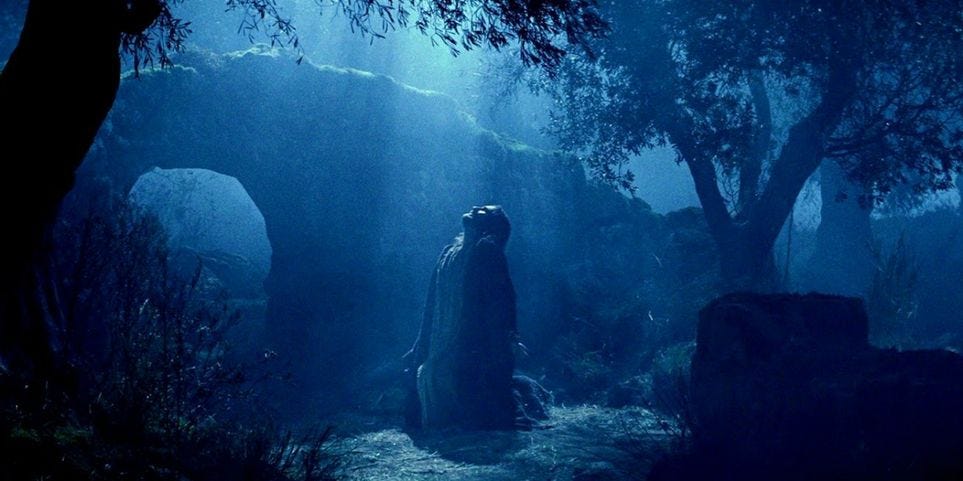Mel Gibson’s The Passion of the Christ will probably forever remain the definitive portrayal of the final hours of the life of Jesus. It is a film that I like to revisit every year during Lent. During my latest rewatch, I noticed a recurring theme throughout.
Several times over the course of the movie, characters appear to be aware of the injustice and evil that they are committing or witnessing, yet they stand idly by or carry out their sinful actions regardless. The first occurrence of this is when Caiaphas’ servant Malchus has his ear cut off by Peter. When Jesus miraculously heals his ear, he knows that this supposed criminal is truly a holy man, and not the dangerous blasphemer that he was sent to arrest. Nevertheless, he lets the other temple guards carry out the arrest without protest.
The most well-known example in the Passion story of someone willingly sinning against God is Judas Iscariot’s betrayal of Jesus. The film depicts the torment that Judas’ soul endures after his betrayal. He is harassed by demons until it drives him into such desperation that he takes his own life instead of repenting and asking forgiveness of his sins.
Pilate and Herod share a similar role in the Passion narrative. They do not wish to condemn Jesus to death, however, neither is willing to prevent his torture and crucifixion from being carried out even though they both believe that he is not dangerous and has done nothing wrong. Herod does nothing because, in his vanity, he simply does not care. Pilate allows the execution due to his own selfish reasons. He is afraid that if he does not allow Jesus to be put to death, the members of the Sanhedrin will inspire a revolt, and he will be punished by the emperor Tiberius.
Caiaphas and his fellow Pharisees are perhaps the most reviling of these sinners. They claim to be protecting the Jewish people from a heretic who espouses blasphemies. The truth is that over the previous century since their founding, certain Pharisees and Sadducees had come to worship ‘the law’, and not the God that gave the law to them. The leaders of the faith had come to view themselves and their oral traditions as the supreme source of authority. They saw Jesus as a threat to that authority, so they had him crucified. During the scourging, these Pharisees (Caiaphas in particular) appear to show apprehension and even disgust in what is happening to Jesus. Instead of calling for an end to his pain, they avert their eyes and walk away, possibly thinking that if they are not present while this heinous act is occurring, their guilt might be assuaged. In Gibson’s portrayal, he ultimately shows us Caiaphas’ guilt overcoming him when the temple is torn in two, and he finally accepts the gravity of the crime that he has committed. Now the divine providence of God required that Jesus lay down his life for the forgiveness of our sins, but that does not excuse or justify the sins of these individuals.
We often like to display scorn towards these ‘villains’ of the Passion of our Lord. After all, we would never do anything to cause our Lord pain. We could never even dream of striking Christ with rods and whips, or driving nails into his hands and feet, or pressing a crown of thorns into his head. Right?
The horrific truth about the Passion of our Lord is that the most painful thing that Jesus endured during those final twelve hours of his life was not the beatings, it was not the scourging, it was not the crown of thorns, it was not the nails, and it was not the crucifixion. The most painful thing that Jesus endured was the weight of taking the sins of every man and woman that has ever, or will ever live, and putting that burden on himself. The agony that Jesus felt in his last minutes is unimaginable, and the dreadful truth is that every time that you or I sin, Jesus felt the pain of that sin while he was hanging on that cross. What makes it even worse is that much like these ‘villains’ that we disdain so much, we commit these sins with full awareness that what we are doing is a violation of God’s will.
This is why my favorite scene in the entire film is the opening scene of Jesus praying in the Garden of Gethsemane. (I would also like to point out at this time that Jim Caviezel’s portrayal of our Lord Yeshua in this scene and the rest of the film is absolutely magnificent and truly inspired by the Holy Spirit). In the garden, Gibson shows Satan making a desperate final attempt to get Jesus to abandon his Father, and flee from his persecution, giving up on his divine purpose. Satan was able to first bring sin into the world in a garden after all. Unlike Adam, however, Jesus does not succumb to temptation. He humbly accepts his fate and gives himself over to be killed, so that we might be able to live forever with him in paradise. “Father, if you are willing, remove this chalice from me; nevertheless, not my will, but yours, be done.” - Luke 22:42.
As we come to the end of this Lenten season and prepare for the rejuvenation and rebirth of Easter, strive to live out these words of Jesus. Whenever you are drawn towards sin, remember to do the Lord’s will, not your own. Do not give in to sin like Caiaphas, Pilate, Herod, or Judas. Do not abandon Jesus like the Apostles did because they were afraid.
Instead, be like the Pharisees that protest the injustice of the secret council. Be like Simon of Cyrene, who risked his life to prevent Jesus from suffering further torture. Be like John the beloved Apostle who stayed by Jesus’ side until the end. Give thanks to the Lord your God for the gift of salvation and be a vessel of his merciful love throughout this Easter season and beyond.
I encourage you all to watch The Passion of the Christ today on Good Friday as we mourn Jesus’ suffering and prepare to celebrate his glorious resurrection on Sunday. I understand that it may not be the easiest film for you to watch, but it is the truth. It depicts what our Lord had to endure to forgive the debt of our sins. Even if you have to fast forward or look away during the scourging and some of the more violent parts, I would still ask you to revisit the movie as it is maybe the most beautiful and inspired piece of Christian art ever made. You can buy it on DVD or Blu-Ray, rent it, or stream it for free on Prime Video if you have an Amazon Prime account. Also, if you haven’t heard about it yet, I would encourage you all to go see Father Stu in theaters this weekend. It features not only Mr. Gibson but another fellow Catholic, Mark Wahlberg. Get out and support new and exciting Christian art!
“But he was wounded for our transgressions, he was bruised for our iniquities; upon him was the chastisement that made us whole, and with his stripes we are healed.” - Isaiah 53:5.
God bless you all and have a joyous Easter!
-Michael







